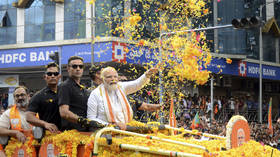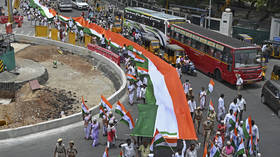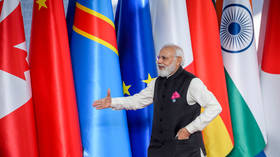Why the battle around Uniform Civil Code is crucial for India

Indian Prime Minister Narendra Modi has raised the pitch for a nationwide implementation of the Uniform Civil Code (UCC), which refers to “a common code of personal laws for people of all religions” while hitting out at opposition parties for allegedly inciting minority communities against it and indulging in “vote-bank politics.”
The prime minister made the statement on Tuesday in Bhopal, the capital of the central Indian state of Madhya Pradesh, which has an election later this year.
India has two sets of laws, including complex personal laws that refer to citizens practicing diverse faiths such as Hinduism, Christianity, Islam, Buddhism, Sikhism, Jainism, and Zoroastrianism, which dates back to the British colonial era, while the Indian Constitution guarantees and safeguards equality to all faiths.
Modi’s statement came days after the 22nd Law Commission invited the views of the public and recognized religious organizations on common civil code within the next 30 days.
Justice Rituraj Awasthi, the chairman of the Law Commission, told Indian news agency ANI it had received “a huge response” over the UCC after publishing the notice—over 850,000 responses were received by Tuesday. “We are making efforts to have wide consultations with all the stakeholders and the organization,” he added.
What was Modi’s messages?
The prime minister chose an opportune moment to promote a ‘one country, one law’ concept as he addressed booth-level workers of the right-wing Bharatiya Janata Party (BJP) in Bhopal last weekend. Modi indicated his government’s intent to implement the UCC.
Modi urged Muslims, India’s single-largest minority group, accounting for over 15% of a 1.4 billion population, to be aware of their rights. He said Muslims must understand which political parties are taking advantage of them.
“We are seeing that work is being done to instigate such people in the name of Uniform Civil Code. If there is one law for one member in a house and another for the other, will the house be able to run? So how will the country be able to run with such a dual system?” he asked.
The prime minister raised the demand for the nationwide implementation of the UCC at a critical juncture, as the next parliamentary elections are less than a year away.
BJP leaders such as Home Minister Amit Shah and a former party chief have emphasized that the implementation of the UCC has been a promise of the BJP since the days of its earlier avatar, the Bharatiya Jana Sangh, in the early 1950s.
The BJP successfully delivered on two other electoral pledges over the last nine years, including the construction of a temple for the Hindu god Lord Rama in Ayodhya, Uttar Pradesh, and the abrogation of Article 370 that stripped special privileges for Jammu & Kashmir, which is the only state in the country to have a Muslim majority.
What is UCC?
Uniform Civil Code is aimed at replacing personal laws based on religions, customs, and traditions. It is one common law for all Indian citizens, irrespective of religion, caste, creed, sexual orientation, and gender.
Article 44 of the Indian Constitution stipulates that the state “shall endeavor to secure for the citizens a uniform civil code throughout the territory of India.” A uniform regulation was seen by the founding fathers of the constitution as replacing the archaic personal laws overseeing marriage, divorce, and inheritance. It was meant to be adopted over a period of time as Indian democracy matures through the decades.
As Abhinav Mehrotra, assistant professor at O.P. Jindal Global University, noted, explaining the phenomenon of the UCC, Article 44 finds a place under Part IV of the Constitution that deals with Directive Principles of State Policy, which are not enforceable in any court, but the principles laid down therein are “nevertheless fundamental in the governance of the country,” making it a duty of the state to apply them in lawmaking.
India’s Supreme Court has emphasized the importance of having a UCC in several landmark judgments, starting from Mohd. Ahmed Khan vs Shah Bano Begum ruling in 1985 to the more recent Shayara Bano versus Union of India lawsuit. Both cases questioned the legitimacy of the practice of talaq-e-bidat (triple talaq), with the apex court declaring it unconstitutional.
The court was conflicted whether to give prevalence to the Code of Criminal Procedure or the Muslim Personal Law – the Shariat Act enacted in 1937, which is widely seen as discriminatory towards Muslim women.
In 2015, a Supreme Court bench comprising then-Chief Justice TS Thakur and member judges AK Sikri and R Banumathi, had refused to entertain public interest litigation filed by Ashwini Kumar Upadhyay, saying it cannot direct parliament to introduce the UCC as these issues are outside its realm.
In 2018, the Law Commission stated in a 185-pages consultation paper that UCC was “neither necessary nor desirable at this stage,” holding that secularism cannot contradict the plurality prevalent in the country.
The report, however, recommended that discriminatory practices, prejudices, and stereotypes within a particular religion and its personal laws should be studied and amended.
Is UCC in force anywhere in India?
Goa, a former Portuguese colony (1510 to 1961), is today the only Indian state to have the uniform civil code. Portugal enacted a Portuguese civil code in 1867 and soon extended it to Portugal’s overseas provinces, including Goa.
Its implementation in the state is a model that other states could follow, Goa’s chief minister, Pramod Sawant, said last year. Critics, however, point out that some of the provisions of the UCC are not uniform and make allowance for the practices of different communities.
Some BJP-ruled states such as Uttarakhand, Himachal Pradesh, Assam, and Gujarat have taken steps towards implementing the UCC to help the party’s efforts in bringing the entire country under the unified personal law.
What is the opposition saying?
Opposition parties which are trying to forge unity to deny the BJP a third consecutive term have slammed the prime minister for resorting to “divisive politics” ahead of five state elections later this year and the 2024 parliamentary election.
Congress leader P. Chidambaram criticized Modi’s rhetoric equating the nation to a family while pitching the UCC.
“A family is knit together by blood relationships. A nation is brought together by a constitution, which is a political-legal document. Even in a family there is diversity. The constitution recognized diversity and plurality among the people of India. A UCC is an aspiration. It cannot be forced on the people by an agenda-driven majoritarian government,” he tweeted.
The Hon'ble PM has equated a Nation to a Family while pitching for the Uniform Civil Code (UCC)While in an abstract sense his comparison may appear true, the reality is very differentA family is knit together by blood relationships. A nation is brought together by a…
— P. Chidambaram (@PChidambaram_IN) June 28, 2023
The opposition has blamed the BJP for aiming at communal polarization while touching upon UCC, citing the PM’s remarks on triple talaq and Pasmanda Muslims.
The Indian leader’s address in Bhopal outlines the BJP’s bet on weakening the stranglehold of the Muslim personal law among the socially backward and economically marginalized Pasmanda community, constituting 90% of the Muslim population.
The All India Muslim Personal Law Board (AIMPLB), a non-governmental organization that was founded in Hyderabad in 1973 to represent the community’s interests, held an emergency meeting on Tuesday night following Modi’s strong pitch for the UCC. Plans are afoot to send AIMPLB’s side of the argument to the Law Commission, opposing the nationwide implementation of the UCC.
Maulana Arshad Madani, the chief of Jamiat Ulema-e-Hind, the largest Muslim body of India and a member of AIMPLB, told NDTV on Wednesday that there is little hope of the Muslim views being heard.
“We know whatever the Law Commission decides – it will not be based on what we say, no matter how many thousands of delegations or requests we send. It will take into account the views of the government... Now that the PM is supporting it, expecting the Law Commission to take our views into account is too much,” he said.
Asaduddin Owaisi, the president of the All India Majlis-e-Ittehadul Muslimeen, said the move will strip the country of its pluralism and diversity.
“When he (Modi) speaks of UCC, he is speaking of Hindu Civil Code... I challenge him – can he abolish Hindu Undivided Family? ... go and tell the Sikhs in Punjab about UCC, see what will be the reaction there,” Owasi said.
The Dravida Munnetra Kazhagam (DMK) party, which rules the southern state of Tamil Nadu, said the UCC should be applied to those following the Hindu religion first.
“The UCC should be first introduced in the Hindu religion. Every person including [those belonging to the] Scheduled Castes and Tribes should be allowed to perform rituals in any temple in the country. We don’t want UCC only because the constitution has given protection to every religion,” DMK leader TKS Elangovan said.
Similarly, over 30 tribal organizations in the eastern Indian state of Jharkhand on Sunday decided to urge the Law Commission to withdraw the move to implement the UCC across the country. They argued that its implementation may put tribal identity in danger in the country. They also decided to launch an agitation against the new consultation on the UCC by the Law Commission.
The Aam Aadmi Party, a bitter critic of the Modi government, has surprised many by endorsing the UCC bid “in principle,” even though the party’s leadership emphasized the importance of wide consultations with all stakeholders to ensure a consensus-based approach to the implementation of the UCC.















